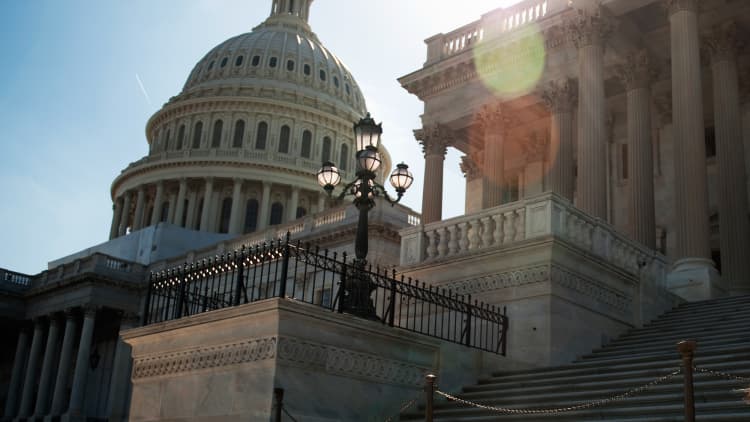Slack filed a complaint against Microsoft with the European Commission alleging anticompetitive behavior, the company said on Wednesday.
Slack alleges in the complaint that Microsoft abused its market dominance to eliminate competition for its Teams work communication product by tying it to its popular Office productivity suite. Slack claims that move meant millions were forced to install the app without the ability to remove it. Slack runs a service that competes directly with Microsoft Teams.
Slack's stock fell 5.1% Wednesday and Microsoft's rose 1.4%.
In a statement, a Microsoft spokesperson said, "We created Teams to combine the ability to collaborate with the ability to connect via video, because that's what people want. With Covid-19, the market has embraced Teams in record numbers while Slack suffered from its absence of video-conferencing. We're committed to offering customers not only the best of new innovation, but a wide variety of choice in how they purchase and use the product. We look forward to providing additional information to the European Commission and answering any questions they may have."
A spokesperson for the EU Competition Commission confirmed it received the complaint and said in a statement, "We will assess it under our standard procedures."
The complaint stems from previous frustrations at Slack. CEO Stewart Butterfield told The Verge in an interview in May, "Microsoft is perhaps unhealthily preoccupied with killing us, and Teams is the vehicle to do that." Still, Butterfield told CNBC earlier that month that "Teams is not a competitor to Slack," even though a filing with the Securities and Exchange Commission names Microsoft as Slack's "primary competitor."
On a call with reporters following the announcement, Slack Vice President of Communications and Policy Jonathan Prince said Butterfield's past comments were meant to highlight the different propositions of Slack and Teams, and noted Microsoft also lists Slack as a competitor in SEC filings.
Microsoft has largely avoided scrutiny from antitrust authorities in recent years after the landmark case against the company brought by states and the Justice Department around the turn of the century. In that case, U.S. officials accused Microsoft of maintaining a monopoly by bundling its browser, Internet Explorer, to its Windows operating system. Prosecutors argued that this limited the marketplace for competing browsers for Windows.
Slack's complaint echoes aspects of that earlier Microsoft case by claiming the company bundles its Teams product to its Office suite.
"Microsoft is reverting to past behavior," Slack's General Counsel David Schellhase said in a statement in the press release announcing the complaint. "They created a weak, copycat product and tied it to their dominant Office product, force installing it and blocking its removal, a carbon copy of their illegal behavior during the 'browser wars.' Slack is asking the European Commission to take swift action to ensure Microsoft cannot continue to illegally leverage its power from one market to another by bundling or tying products."
Prince said that Microsoft's recent finger-pointing at other tech companies has deflected attention from its own practices. Microsoft President Brad Smith said at a Politico event in June that there should be more antitrust scrutiny of app store rules. Though he didn't name names, Smith criticized practices by rivals Apple and Google. Recently, Smith reportedly raised his concerns with Apple to the House Antitrust Subcommittee, according to Bloomberg and The Information.
"Of course they're saying things like that, they mounted since the 90s a decades-long attempt to kind of burnish their image and portray themselves as kind of paragons of healthy competition while behaving very very differently," Prince said on the call.
Slack's move to file its complaint in the E.U. is telling. Though both companies are based in the U.S., Slack is undoubtedly aware of the E.U.'s recent history of aggressive antitrust enforcement under Competition Commissioner Margrethe Vestager. Vestager has brought record fines against Google and has announced or is reported to be investigating several other major U.S. tech companies including Amazon, Apple and Facebook. Spotify used a similar strategy in March of 2019 when it filed an antitrust complaint against Apple in the E.U.
On the press call, Schellhase said Slack's decision to file its complaint with the European Commission was made "very deliberately."
"The European Commission has been very forward-thinking and very vocal about anticompetition law and their desire to create a level playing field for all competitors for the benefit of customers, obviously," he said. "They've signaled also a desire to resolve things very quickly. They've signaled that they're going to be creative about remedies."
Schellhase said Slack has asked for remedies including separating Teams from the Office suite and give the product a visible price.
Still, the complaint is likely to raise questions among U.S. antitrust authorities, whose investigations of the tech industry have been among the most closely watched. Schellhase said that while Slack has yet to take similar actions in the U.S., executives are talking to "relevant authorities" and "we're keeping all of our options open."
Microsoft hasn't completely escaped scrutiny by U.S. officials, though it has certainly seen less attention than many of its peers. The Federal Trade Commission's Office of Policy Planning included Microsoft in its review of past acquisitions in the tech industry, a project that is not part of its enforcement arm but could dig up potential enforcement issues.
-CNBC's Steven Kopack and Steve Kovach contributed to this report.
WATCH: How US antitrust law works, and what it means for Big Tech



